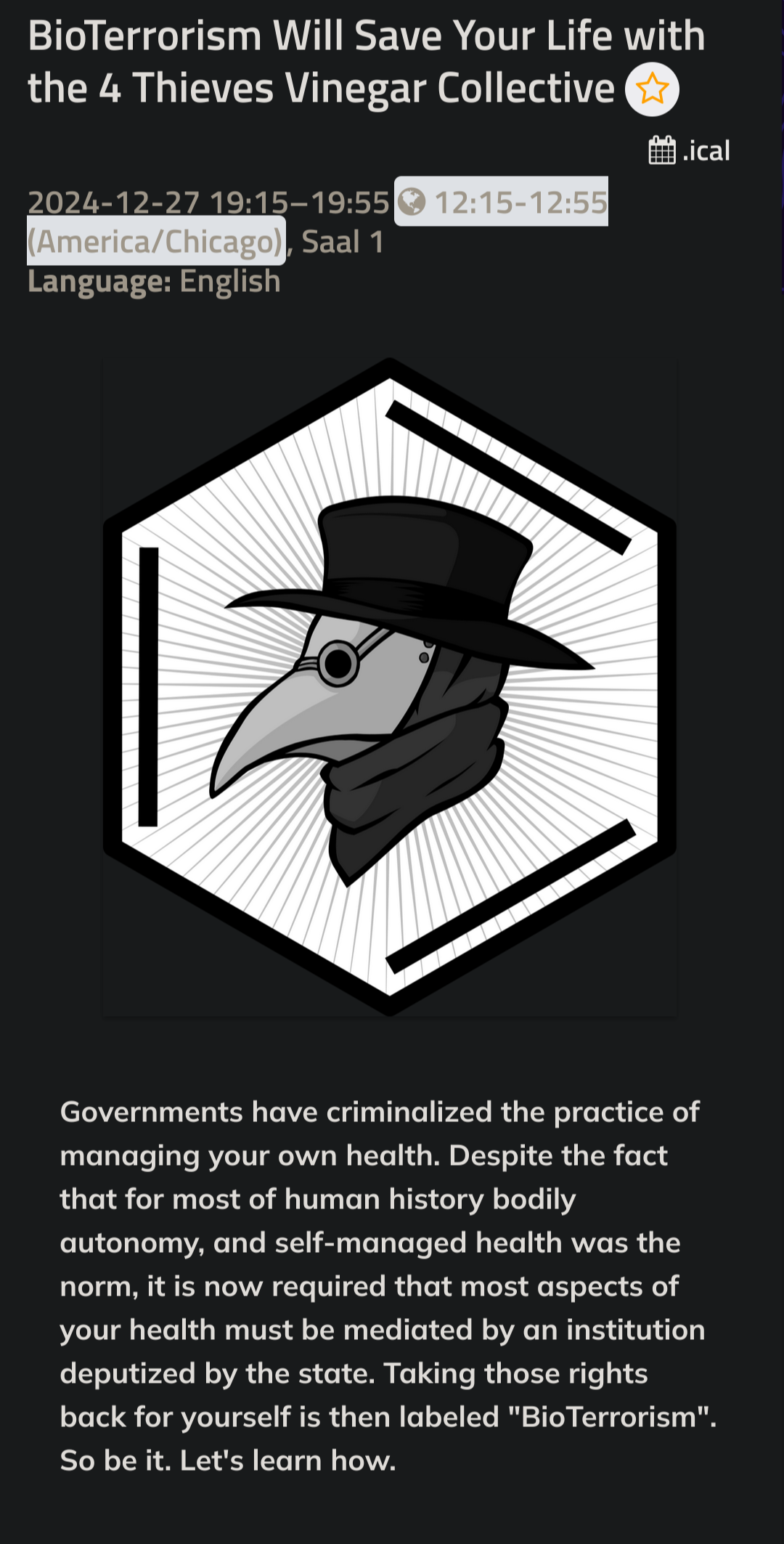~~pharmacists solely being distributors of pre-ordained medication has no detrimental effects on humans. 🫠 the US is great to its people, and has very good healthcare practices!!~~ (livestream is on the 27th and i am excite, but not involved at all)
https://fahrplan.events.ccc.de/congress/2024/fahrplan/talk/ASBXWW/
stream link for those interested:
https://streaming.media.ccc.de/38c3
EDIT: my lack of capitalization and poor word choice has confused people. this event is about making legal, tested for efficacy medication only. pharmacists are good. doctors are good. the cost of medication and other hurdles that prevent people from having access to medication are not.
EDIT 2: i looked into the 4 Theives Vinegar Collective (breifly, just on wikipedia) and i did not realize that they made the EpiPencil, which is an open-source device that injects a mesured dose of epinephrine (a medication that can be bought from a trusted and legal distributor). that's awesome stuff, but it's less awesome that they now want to share chemistry knowlege that they don't necissarily have a full understanding of, and push automated synthesis for people who also don't have the foundational knowledge to ensure safety. not really great. i guess that's what happens when healthcare is entirely for-profit, and inaccessable to so many people.

Sure, but if the alternative is not getting the medicine..
they've made juicero of backyard chemistry. everything you can do with that bullshit jar strapped to arduino you can do with hotplate and standard glassware - and cheaper - and even more because their setup doesn't allow you to run reflux sanely among others. putting procedures as a set of instructions for said arduino is no substitute for actual expertise. iirc their procedure for naloxone can fail in such a way that another pharmaceutical of opposite activity can be made (oxymorphone). there's zero analysis or quality control that would catch this. they're trying to generate synthesis pathways with ai. laufer has no actual training in chemistry, his degree is in maths and i suspect heavy case of engineer syndrome
there's also little consideration, if any, about purification and waste management. do you feel lucky?
that sounds..... questionable, almost at best. i will still probably tune in, but i'm now prepared to be kind of horrified honestly. i'm not sure someone with a math degree and no chemistry experience is the best source for this kind of information, especially when the substances being produced are meant to be consumed.
even with a chemistry degree, it’s very common for professionals to overestimate others ability to comprehend their field, and for beginners to overestimate their ability
when it comes to synthesising drugs, that’s a recipe for disaster
good thing these guys seem in love with automating the process... 🙃
leaving most of the brain-thinkie parts up to an arduino totally solves the "this might kill someone" factor. no-knowledge synthesis is the future! (/s for anyone wanting to toss reagents in a jar, and hope robots are infallable)
really tho, mistakes that make fries taste bad, or twist an ankle don't have shit on barely messing up a step in a synthesis that is to be consumed. it is like their reckless abandon is also intended to be a part of their cause, which makes things more confusing, and raises even more ethical questions.
Well, there's actually a third point on your scale, which is "The opposite of medicine."
If you take something for pain management and it kills you, is that better than not having the pain meds at all? For some people that's a complicated question; chronic pain can absolutely make someone wish they were dead. So maybe someone is desperate enough to try this in spite of the risks. But they should at least know those risks, right?